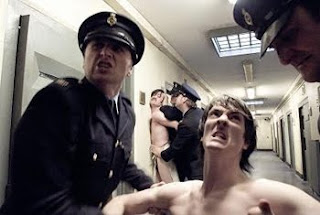 Prisons have become a playground for the wicked. Every day we hear in the news about phone extortions directly from jail, bribes to guards and violence between inmates as many of the occurrences that happen on a day-to-day bases. Imagine yourself entering prison and facing a system that demands violence to survive (we realize that prisoners don’t enter to reform, they merely enter to strive).
Prisons have become a playground for the wicked. Every day we hear in the news about phone extortions directly from jail, bribes to guards and violence between inmates as many of the occurrences that happen on a day-to-day bases. Imagine yourself entering prison and facing a system that demands violence to survive (we realize that prisoners don’t enter to reform, they merely enter to strive). In the French movie “A Prophet” we meet Malik El Djebena, a man caught between the rivalry of two groups: the Corsicans (the dominant mafia) and the Muslims (who seem to be comfortable in small schemes of drug trade and petty crime). Malik is offered a choice almost immediately, either kill an important Muslim and be offered protection or be killed. For Malik the choice is obvious although the act itself gets pretty messy and gruesome since he is not a killer.
“A Prophet” is an amoral tale that focuses on the crime scheme and its inner connections and how a man climbs his way to the top. Malik is far from your typical protagonist and there isn’t a single moment in the film where he is looking for redemption (even though he is sometimes tormented by some of his actions, especially his first murder).
For the most part guards keep a blind eye as long as they are being bribed and for inmates like Cesar Luciani (the mob kingpin) jail becomes almost a resort.
The characters in “A Prophet” don’t live the brutality of prison life as seen in “Hunger”, a spellbinding and intense Irish production that features a stunning performance by Michael Fassbender (who starred in “Fish Tank” and Tarantino’s “Inglourious Basterds”).
For those who refuse to abide the rules there are a number of tortures that include endless beatings or confinement in a disgusting room covered in human feces. Death isn’t a far though for prisoners, even for terrorists who are willing to go to extreme measures like hunger strikes to protect their ideals.
“Hunger” contains several virtuoso sequences that transform a regular drama into a poetic and tragic tale (there’s a conversation between an inmate and a priest done in one take that is brilliantly acted). At the end we gaze at the amazing transformation of Fassbinder, who as Bobby Sands acts as the leader of the movement and its inevitable martyr.
Both Sands and Malik are criminals and while their movies never glorify their behavior they certainly observe how a corrupt system favors those who deserve punishment. The overall message is: the system is flawed. Even in a thriller like “Cell 211” there’s a strong element of social critique as the inmates of a Spanish prison take hold of the establishment and demand changes from the abusive staff. That film is mostly content on delivering an entertaining and arresting (no pun intended) experience but you can also realize that beneath its fictitious elements lies an accurate portrayal of prison life. It’s a very good movie.
“A Prophet”, “Hunger” and “Cell 211” are very different films, but each of them shows us that jails are dangerous and corrupt asylums that cannot be called places of healing. In our cynical times we are not permitted to witness a man that truly repents for his actions (I remember Morgan Freeman’s terrific speech in “The Shawshank Redemption” before the prison committee). As long as the system stays the same, the cycle of violence will continue forever.

No hay comentarios:
Publicar un comentario